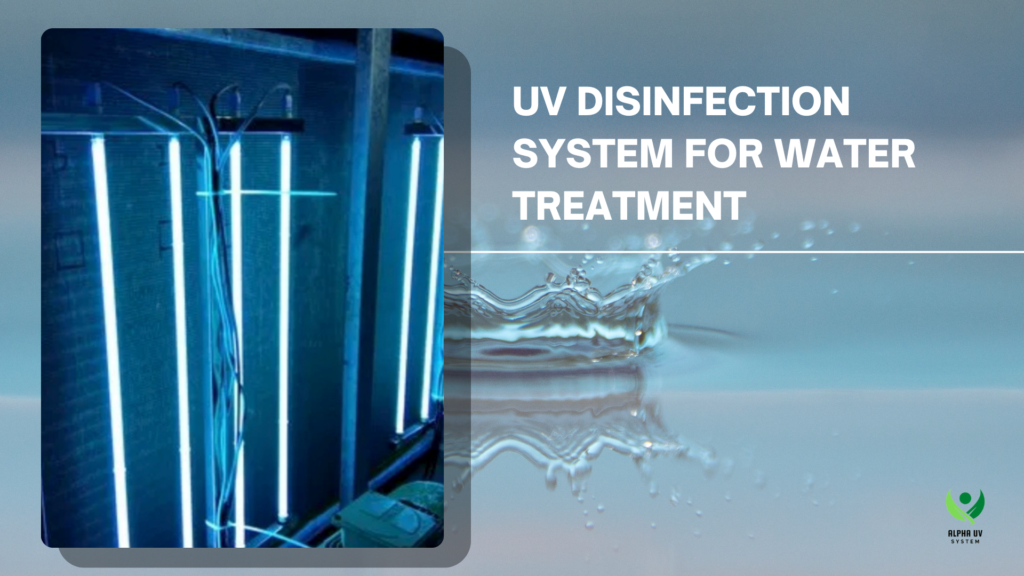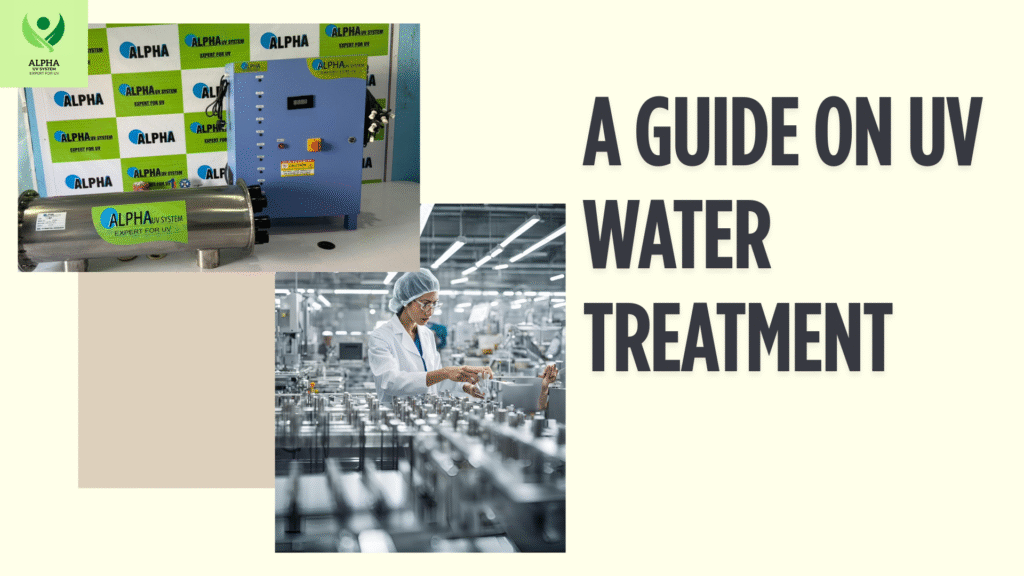INDUSTRIAL UV SYSTEM
An industrial UV system is a specialized water treatment technology that uses ultraviolet (UV) light, typically UV-C at a wavelength of 253.7 nanometers, to disinfect and purify water for large-scale industrial applications. These systems effectively eliminate bacteria, viruses, pathogens, and other harmful microorganisms without using chemicals, making the process eco-friendly and safe.
Industrial UV systems are widely used across various industries such as pharmaceuticals, food and beverage, electronics manufacturing, chemical processing, agriculture, and wastewater treatment. They ensure microbial safety in process water, boiler feed water, cooling tower water, and wastewater streams, helping industries comply with strict regulatory standards like FDA and GMP.
Key Benefits of Installing Industrial UV Systems
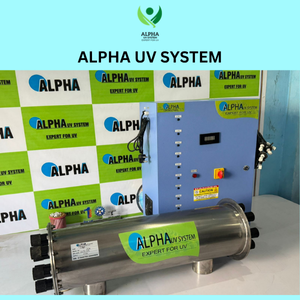
Industrial UV systems offer numerous advantages that make them the preferred choice for industrial water treatment. These systems provide instantaneous disinfection without chemical storage or handling requirements, reducing operational complexity and safety risks. Industrial UV systems achieve 99.99% pathogen elimination while maintaining water’s natural taste, odor, and chemical composition. Additionally, these systems support environmental sustainability goals by eliminating toxic disinfection byproducts and reducing carbon footprint.
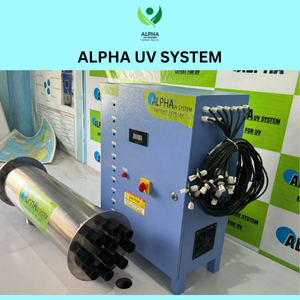
Highly Effective Microbial Disinfection with Industrial UV Systems
UV systems deliver superior pathogen elimination through advanced UV-C technology operating at precisely 253.7 nanometers wavelength for maximum microbial inactivation. These UV systems utilize high-intensity mercury vapor lamps that deliver UV doses ranging from 16-40 mJ/cm², ensuring comprehensive disinfection of bacteria, viruses, protozoa, and molds through direct DNA and RNA disruption. UV systems consistently achieve 99.99% destruction rates against challenging pathogens including E. coli, Salmonella, Cryptosporidium, and Giardia, making them ideal for critical industrial applications. The broad-spectrum effectiveness of UV systems extends to chlorine-resistant organisms, while their low-pressure and medium-pressure lamp options accommodate varying water quality conditions, ensuring reliable disinfection performance across diverse industrial environments.
Chemical-Free Treatment Provided by Industrial UV Systems
UV systems revolutionize water treatment by eliminating the need for chemical storage, handling, or dosing equipment, significantly reducing safety hazards and operational complexity in industrial facilities. These chemical-free UV systems preserve water’s natural taste, odor, pH, and mineral content while producing zero disinfection byproducts, making them environmentally sustainable and safe for sensitive industrial processes. Unlike traditional chemical treatment methods, UV systems maintain beneficial minerals while eliminating harmful microorganisms, supporting both water quality and environmental responsibility. The zero-chemical operation of UV systems eliminates transportation costs, regulatory compliance burdens, and environmental liability associated with hazardous chemical storage and handling, providing substantial operational and financial benefits for industrial facilities.
Rapid and Efficient Process Using Industrial UV Systems
UV systems provide instantaneous, contact-free disinfection that occurs within seconds of UV exposure, eliminating the need for detention time or chemical contact periods that slow production processes. The continuous flow-through design of UV systems enables seamless integration into existing production lines without requiring storage tanks or holding facilities, maximizing operational efficiency. Modern UV systems feature automated start-up capabilities with no warm-up time requirements, ensuring immediate operation and consistent water quality delivery. This real-time treatment capability makes UV systems ideal for industries requiring rapid water processing, as they can handle varying flow rates while maintaining consistent disinfection performance without interrupting critical manufacturing processes.
Low Operating and Maintenance Costs of Industrial UV Systems
UV systems demonstrate exceptional energy efficiency, consuming only 0.04-0.13 kWh per 1,000 gallons treated through advanced electronic ballast technology and optimized reactor design. The long-lasting UV lamps in UV systems operate continuously for 8,000-12,000 hours before requiring replacement, significantly reducing maintenance frequency and operational costs. These UV systems require minimal maintenance consisting primarily of periodic lamp replacement and quartz sleeve cleaning, with no moving parts to wear out or require mechanical servicing. Advanced UV systems incorporate automated monitoring with UV intensity sensors and alarm systems that reduce manual oversight requirements while ensuring optimal performance, making them highly cost-effective solutions for long-term industrial water treatment applications.Versatile and Scalable Industrial UV Systems
UV systems offer exceptional flexibility with flow rate capacities ranging from 1 GPM to 290+ GPM, accommodating small pilot operations to large-scale industrial facilities through modular design configurations. These adaptable UV systems can handle diverse water qualities with UV transmittance ranging from 50-95%, making them suitable for various industrial applications including process water, cooling tower water, and wastewater treatment. The modular construction of UV systems allows easy capacity expansion through parallel installation, providing scalable solutions that grow with industrial facility needs. Multiple mounting and connection options for UV systems include skid-mounted, containerized, flanged, and threaded configurations, ensuring seamless integration with existing treatment infrastructure across different industrial environments.
Environmentally Friendly and Safe Industrial UV Systems
UV systems eliminate chemical spill risks and hazardous material storage requirements, creating safer working environments and reducing environmental liability for industrial facilities. The zero-carbon footprint disinfection process of UV systems supports green building certifications and environmental compliance goals while eliminating groundwater contamination risks associated with chemical treatment methods. These environmentally conscious UV systems feature contained UV radiation with comprehensive safety interlocks that prevent human exposure during operation and maintenance activities. The sustainable operation of UV systems contributes to corporate social responsibility initiatives by reducing chemical waste, eliminating toxic byproducts, and minimizing the environmental impact of industrial water treatment processes while maintaining superior disinfection performance.
Regulatory Compliance Made Easy
UV systems meet comprehensive regulatory standards including NSF/ANSI 55 certification for UV water treatment equipment and FDA/GMP compliance requirements for pharmaceutical and food processing applications. These validated UV systems provide documented log reduction performance data essential for regulatory reporting and permit compliance, while third-party validation ensures systems meet stringent industry-specific standards. Advanced UV systems incorporate comprehensive monitoring and documentation features that automatically generate compliance records, simplifying regulatory reporting and audit processes. The proven performance and regulatory acceptance of UV systems across multiple industries ensures facilities can confidently meet evolving water quality standards while avoiding costly compliance issues and regulatory penalties.
Preservation of Water Quality Through
UV systems maintain water’s natural mineral content, chemical composition, conductivity, pH, and total dissolved solids throughout the disinfection process, ensuring treated water remains suitable for sensitive industrial applications. The non-chemical treatment approach of UV systems preserves water clarity, aesthetic properties, and essential characteristics while eliminating only harmful microorganisms. Temperature-controlled operation in UV systems prevents thermal alteration of water properties, while corrosion-resistant 316L stainless steel construction ensures no metallic contamination or taste alteration. This water quality preservation capability makes UV systems ideal for industries requiring high-purity water, as they provide effective disinfection without compromising the physical, chemical, or aesthetic properties essential for manufacturing processes, product quality, and regulatory compliance requirements.
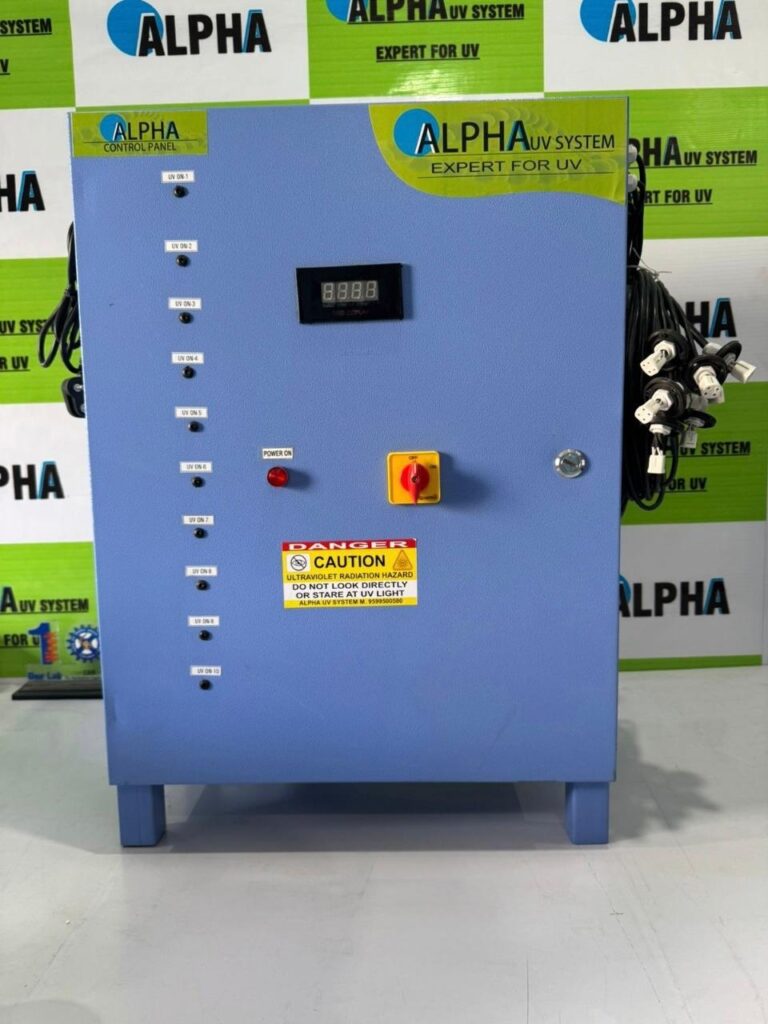
Installation Guide for UV Systems
Installing UV systems properly is crucial for achieving optimal water disinfection performance and long-term reliability. The installation process for UV systems begins with careful hydraulic design analysis to ensure proper water flow patterns through the UV reactor chamber. Professional technicians must evaluate existing water treatment infrastructure to determine the best integration points for UV systems, considering factors like pipe diameter, flow velocity, and pressure requirements. Proper electrical connections for UV systems require dedicated circuits with appropriate voltage ratings, typically 120V-480V depending on system size, along with ground fault circuit interrupters (GFCI) for safety compliance.
The physical installation of UV systems involves mounting the UV reactor chamber in a location that allows easy access for maintenance while protecting the unit from environmental factors. UV systems must be installed with adequate clearance around the reactor chamber to facilitate lamp replacement and quartz sleeve cleaning procedures. Proper bypass piping installation around UV systems enables continued water flow during maintenance activities without interrupting critical industrial processes. Professional installers ensure that UV systems are positioned to maintain optimal water flow distribution, preventing short-circuiting or dead zones that could reduce disinfection effectiveness.
READ OUR LATEST BLOGS
UV DISINFECTION SYSTEM FOR WATER TREATMENT
Water treatment is a critical aspect of ensuring public health, and the need for effective disinfection has never been more apparent.
Understanding the UV Water Treatment System
In today’s world, access to clean and safe water is more important than ever. As industries grow and water pollution increases, finding effective and eco-friendly ...

